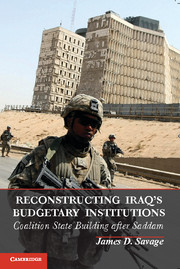Book contents
- Frontmatter
- Dedication
- Contents
- List of Tables
- List of Figures and Illustrations
- Preface
- Abbreviations
- 1 State Building and the Reconstruction of Iraq’s Budgetary Institutions
- 2 The Evolution of Iraqi Budgetary Institutions from the Ottomans and the British Mandate through Saddam
- 3 Prewar Planning for Iraq’s Economic and Budgetary Reconstruction
- 4 Boots on the Ground
- 5 Building Iraqi Ministerial Capacity
- 6 The 17th Benchmark and the Challenge of Iraqi Budget Execution
- 7 Building Iraqi Budgetary Capacity
- 8 Iraqi Budgeting
- 9 Successful State Building in Iraq?
- Bibliography
- Index
- References
2 - The Evolution of Iraqi Budgetary Institutions from the Ottomans and the British Mandate through Saddam
Published online by Cambridge University Press: 05 June 2014
- Frontmatter
- Dedication
- Contents
- List of Tables
- List of Figures and Illustrations
- Preface
- Abbreviations
- 1 State Building and the Reconstruction of Iraq’s Budgetary Institutions
- 2 The Evolution of Iraqi Budgetary Institutions from the Ottomans and the British Mandate through Saddam
- 3 Prewar Planning for Iraq’s Economic and Budgetary Reconstruction
- 4 Boots on the Ground
- 5 Building Iraqi Ministerial Capacity
- 6 The 17th Benchmark and the Challenge of Iraqi Budget Execution
- 7 Building Iraqi Budgetary Capacity
- 8 Iraqi Budgeting
- 9 Successful State Building in Iraq?
- Bibliography
- Index
- References
Summary
Practitioners commonly warn that those about to engage in state building should first come to know local history, culture, and institutions. Through a deeper understanding of the preferences of those who are the presumed beneficiaries of such activities, the scope of the task is better comprehended, planning is enhanced, errors are potentially reduced, conflict with locals is minimized, and the possibilities of gaining local ownership and buy-in increased. The Americans who planned the invasion and occupation of Iraq, however, knew little or nothing about Iraqi budgetary institutions, their histories, or even their functions within the budgetary process, though they later made significant attempts to change Iraq’s budgetary rules and the way these organizations worked and how they related to each other. Understanding the challenges the Coalition faced in attempting to make these institutional changes first requires an appreciation for the rootedness of these institutions in Iraqi history and politics.
When Coalition forces entered Iraq in March 2003, what were the Iraqi budgetary institutions they encountered? What were their origins, incentive structures, hierarchies, established power relationships, networks, procedures, and practices? These institutions included the legal framework governing the budgetary process and the organizational entities that exercised authority in formulating, approving, and managing the budget. These institutions originated with the Ottomans, the British occupation and Mandate, and the Ba’athist regime. These institutions were layered upon each other. Sometimes new rules, processes, and organizations abruptly displaced or were imposed on existing ones. Sometimes these new institutions incorporated or were added to existing institutions rather than fully displacing them. The Iraqis established their first Ministry of Finance during the Mandate, while the Ba’athists later added the Ministry of Planning to the institutions engaged in the budgetary process. In both cases these institutions served the broader political interests of their founders. This chapter examines this legacy of institution building, politics, and policy the Coalition encountered in its own efforts at state building in Iraq.
- Type
- Chapter
- Information
- Reconstructing Iraq's Budgetary InstitutionsCoalition State Building after Saddam, pp. 25 - 46Publisher: Cambridge University PressPrint publication year: 2013



